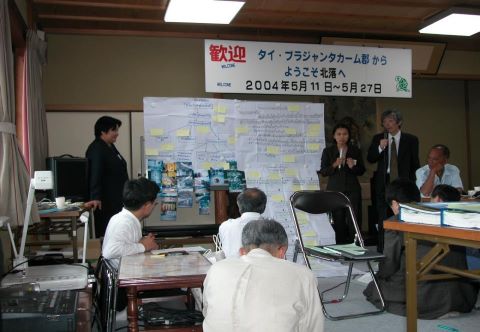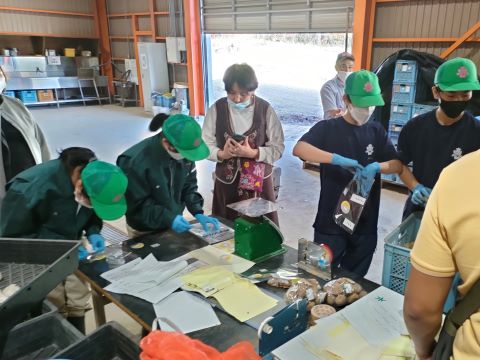For three years from April 2019 to March 2022, I was seconded from JICA to City of Rikuzentakata in Iwate Prefecture, the area affected by the Great East Japan Earthquake, as the Director of Business and Branding Development Division. I would like to share the lessons learned from the experience of being on the frontlines of "Earthquake Recovery" and "Local Innovation".
Value for People Aspiring for Earthquake Recovery and Local Innovation
City of Rikuzentakata is a town in Iwate Prefecture where the entire town, including the city hall building, was devastated and where the "Miracle Pine Tree," a symbol of Tohoku's revival, is located.
The three years I was in Rikuzentakata just straddled the "10-year anniversary" of recovery from the earthquake, and many facilities symbolizing reconstruction were built on the bulged land.
Some of these were government reconstruction projects, but there were also facilities built in collaboration with private companies that supported the recovery, such as Watami Organic Land and the Pecan Nuts facility.
As the division director in charge of " Revival of Livelihood", I had been promoting collaboration with these companies, but I had also been tackling the issues of rebuilding the businesses that were affected by the disaster and restoring vitality to the new central city area.
Some of these experiences taught me valuable lessons. Looking ahead to the post-COVID era, there was a government project to dispatch experts for assisting in product development that could serve as souvenirs, aiming to increase the number of people engaging with the city. Initially, the plan was to invite participants after conducting a wide range of businesses to attend the expert's seminar. However, at the request of the experts, it was decided to hold the seminar after selecting the project participants first. The experts intended to provide support with a clear target from the beginning, but local businesses perceived it in a completely different way.
For a business, product development is a life-long endeavor. What it entails is not something that can be told to just anyone. To consult with an expert means that I trust the expert that much. To listen to an expert beforehand is essential to confirm that "trust" for myself.
Due to the wishes of local business owners, expert assistance is no longer available. The discontinuation of the project itself might be seen as a setback. However, we realized something more profound: 'Listening to and following the genuine concerns of the people in the field.' One day, the president of the Takata Businesses Association (Machinaka-kai) shared with me,
“What matters here is not just what we do but who we do it with. It's not about the task itself but the people we collaborate with that holds significance.”
The purpose of doing business is important. However, what is even more important is to build a relationship of trust that makes people think, "I can work with this person". I learned that in order to achieve this, it is necessary to appreciate the values cherished in the area and the thoughts of the people living there before the objectives you want to achieve.
One of the efforts for reviving local businesses based on this relationship of trust is the Rikuzentakata-Nagoya exchange program. Since the earthquake, City of Nagoya has been sending staff to Rikuzentakata. On the 10th anniversary of the earthquake, the city decided to send a citizen-level exchange delegation.
One of the participants in the exchange group, a business involved in the revitalization of Nagoya's shopping district, decided to hold a joint event with Rikuzentakata businesses, believing that "the real exchange does not end with this exchange group, but rather what is done afterwards". Through repeated exchanges, including visits to Nagoya by Rikuzentakata businesses, the two parties are gradually building a relationship of trust toward the dream of building a commercial facility in Rikuzentakata by Nagoya businesses in the future.
What should we value in international cooperation?
JICA, as the implementing agency for international cooperation, is constantly thinking about what we can do to help developing countries and solve their problems. However, my experience in Rikuzentakata, where I stood as a recipient of assistance in the reconstruction from the earthquake disaster, made me realize once again that there are more important things for supporters than simply providing prescriptions for solving problems.
In the course of actually living in Rikuzentakata and talking with various people every day, I met people who were smiling and positive, but who had in fact lost loved ones, or who were traumatized by the fact that their own houses had been saved but the house right next door had been washed away by the tsunami. I had many opportunities to come in contact with people whose thoughts and feelings came up in a moment of conversation.
International cooperation tends to be preceded by an altruistic desire to "help the local people. This in itself is not a bad thing, but in Rikuzentakata, I found myself thinking more about how I could live together with these people. I have come to believe that the true meaning of the word "leaning in" is to first think about "what I am going to do here..." as a personal matter, even if it is only a small one.
It may be true that "the main character in development are the people who live there, and those who provide support play only a supporting character. However, I believe that what is required of those who provide support in both disaster-stricken areas and developing countries is an attitude of "what I do together with the people living there".
(To be continued)
International Cooperation and Japan’s Local Innovation : (1) Connection between “International” and “Local” | News & Media - JICA
International Cooperation and Japan’s Local Innovation : (2) A Global Bond Born Two Decades Ago | News & Media - JICA










scroll